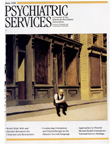Social and living skills of new long-stay hospital patients and new long-term community patients
Abstract
OBJECTIVE: The study assessed differences in social behavior skills and everyday living skills in two groups of psychiatric patients: hospital inpatients with stays of between six months and five years (new long- stay patients) and discharged patients who had resided in the community for a similar length of time (new long-term patients). METHODS: In a cross-sectional study based on a point prevalence survey in an outer London psychiatric hospital, 23 new long-stay and 23 new long-term patients were rated using the Social Behaviour Scale (SBS) and Basic Everyday Living Skills (BELS). RESULTS: Mean scores on both scales indicated significantly poorer functioning in the new long-stay group. Ratings on the BELS self-care and domestic skills subscales also indicated poorer functioning in that group. No significant differences between groups were found for the subscales measuring community and social relations skills. Significant gender differences emerged in ratings of domestic skills; men's scores indicated more impairment in the new long-stay group than in the new long-term group, while women's scores were comparable between the groups. CONCLUSIONS: Developing, enhancing, and maintaining skills among new long-stay patients, especially self-care and domestic skills, may facilitate their discharge into supported community settings.
Access content
To read the fulltext, please use one of the options below to sign in or purchase access.- Personal login
- Institutional Login
- Sign in via OpenAthens
- Register for access
-
Please login/register if you wish to pair your device and check access availability.
Not a subscriber?
PsychiatryOnline subscription options offer access to the DSM-5 library, books, journals, CME, and patient resources. This all-in-one virtual library provides psychiatrists and mental health professionals with key resources for diagnosis, treatment, research, and professional development.
Need more help? PsychiatryOnline Customer Service may be reached by emailing [email protected] or by calling 800-368-5777 (in the U.S.) or 703-907-7322 (outside the U.S.).



